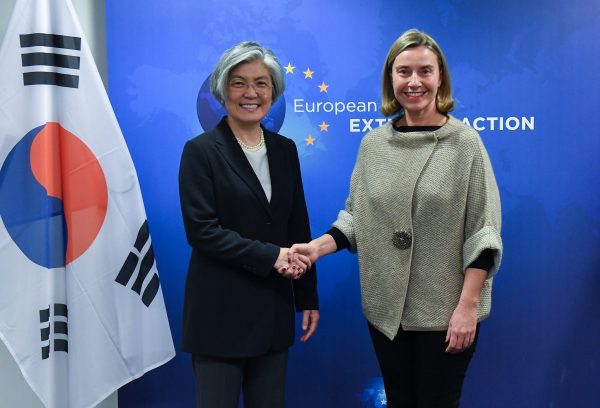In what capacity could the European Union assist in the peace process on the Korean Peninsula?
To understand the European Union’s options, one has to think seriously about its participation in Asian multilateralism. As underlined in the EU Global Strategy in 2016, there is a close and irreversible connection between European prosperity and Asian security. Given the strategic importance of Asia for the European Union, supporting Asia’s regional security architecture is one sensible way to avoid the escalation of possible threats.
But for the last fifty years, the European Union has not been a major player in security issues in Asia. When it comes to the South China Sea dispute, for example, the European Union tends to avoid confrontational statements and strong language that directly references China. It has no intent to play any substantial role, reflecting discord among EU member states over how and by whom the dispute should be resolved.
On a bilateral level, the European Union has been more successful in strengthening its position on the Peninsula. A strategic partnership between the European Union and the Republic of Korea (ROK) was established in 2010. The European Union has figured prominently in a number of bilateral initiatives aimed at reinforcing political and security cooperation with South Korea, such as the EU–ROK Cyber Dialogue and the ROK–EU International Conference on Middle Eastern and North African Affairs which were both launched in 2013.
The European Union intends to be more proactive on the Korean Peninsula by supporting a peaceful reunification process while condemning the development of nuclear facilities in North Korea. Official documents emphasise the European Union’s firm support for solving the North Korea problem through multilateral initiatives such as the Six Party Talks or the ROK’s Northeast Asia Peace and Cooperation Initiative. But these initiatives revealed considerable limitations when it came to guaranteeing that the Democratic People’s Republic of Korea (DPRK) really end its nuclear weapons programs.
A more optimistic scenario may be one where the European Union actively participates in existing multilateral security frameworks in Asia, like the ASEAN Regional Forum, the Asia–Europe meeting or the Shangri-La Dialogue. This would mean going beyond official support statements made by EU representatives during their annual meetings. EU policymakers need to strongly commit to sharing diplomatic know-how on including the DPRK at the table in negotiations on security issues in Asia.
At the same time, the EU’s efforts to support the peace process on the Korean Peninsula cannot rely exclusively on existing multilateral frameworks. It is perhaps more important for the European Union to take seriously its role as a global security actor. The European Union should engage directly with both North and South Korea to confirm their commitment to a peaceful resolution, such as through the launch of an EU–ROK–DPRK trilateral initiative on security cooperation in Northeast Asia. Smaller, ‘mini-lateral’ frameworks could succeed where previous initiatives, such as the Six Party Talks, failed.
Regrettably, the European Union could face some major obstacles to being an effective diplomatic actor in the region. First, the European Union needs to find the right balance between the actors involved other than the two Koreas. The planned meeting between the leaders of the United States and the DPRK has raised hopes about the possibility of denuclearising the Korean Peninsula. Chinese President Xi Jinping has already met with Kim Jong-un twice, in Beijing and Dalian. The European Union must find its place within this complicated triad involving South Korea, China and the United States.
Second, and perhaps more importantly, the European Union should pressure member states to speak with one voice against Pyongyang’s nuclear program. For instance, France does not have political relations with the DPRK and limits cooperation to humanitarian and cultural programs. But Germany has maintained diplomatic ties with North Korea, despite numerous warnings against this from Washington.
The nuclear crisis in the Korean peninsula is challenging the European Union’s capacity to act as a successful participant in international initiatives to bolster security in Northeast Asia. Implications go beyond the European Union’s interest in a new ‘pivot to Asia’, and challenge its global role as a security provider.
Silvia Menegazzi is Postdoctoral Research Fellow at the Department of Political Science, LUISS ‘Guido Carli’ University.


The EU’s best contribution would be to defend the deal with Iran and counter or neutralise US opposition and sabotage.